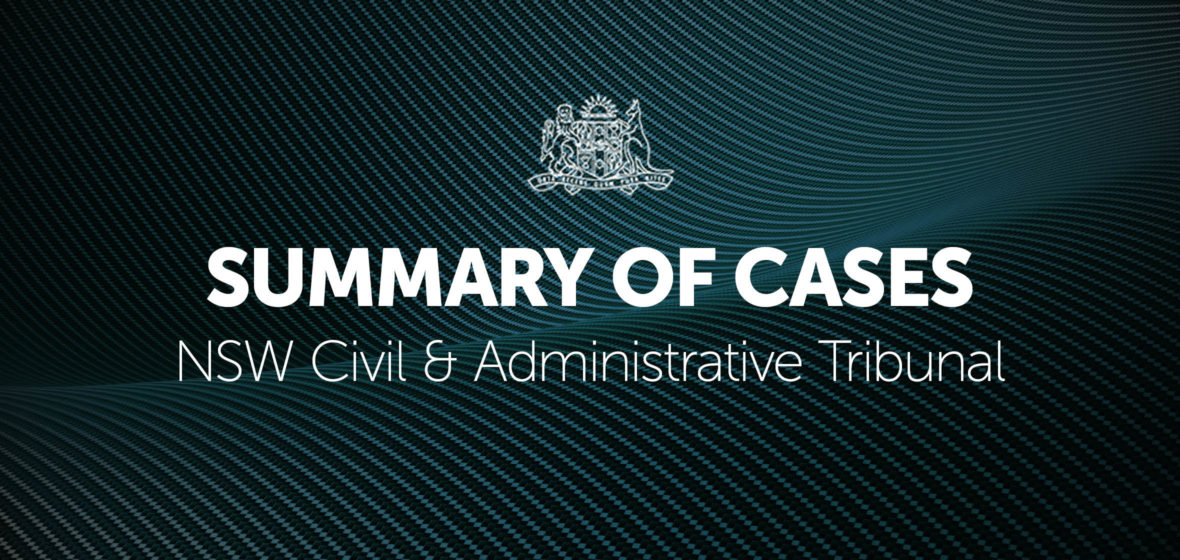The following is a recent decision made by NCAT.
Quinones v Council of the Law Society of New South Wales [2023] NSWCATOD 43
Date of Decision: 3 April 2023. Decision amended on 4 May 2023 and 30 May 2023
On 3 April 2023, the New South Wales Civil and Administrative Tribunal (Tribunal) published a decision in proceedings that a solicitor, Ms Joseline Quinones, commenced to seek a review of the disciplinary findings and orders that the Professional Conduct Committee of the Council of the Law Society of New South Wales (PCC) resolved to make against her.
In summary, the PCC:
- found Ms Quinones guilty of unsatisfactory professional conduct (UPC) on the basis that she failed to pay a barrister’s invoice and failed to pay it within the specified time period, failed to hold money in trust for payment of a barrister’s fees and failed to advise her client of certain of the barrister’s costs agreements; and
- made orders reprimanding Ms Quinones, requiring her to undertake further education and requiring her to apologise to the complainant (i.e. the barrister).
The Tribunal:
- upheld the PCC’s UPC finding (at [30]);
- upheld the PCC’s resolutions to reprimand Ms Quinones and to require her to complete further legal education (at [38]); and
- varied the PCC’s resolution to require Ms Quinones to apologise to the complainant by ordering that Ms Quinones was not required to provide the apology. This was because, as at the date of the hearing, Ms Quinones had resolved her dispute with the complainant and the Council of the Law Society of New South Wales submitted that an apology was no longer warranted (at [35] and [38]).
With respect to the conduct for which the Tribunal agreed the Applicant was guilty of UPC, the Tribunal held:
“[28] It is clear that “wilful or persistent refusal to pay counsel’s fees can amount to professional misconduct on the part of a solicitor”: Re Robb (1996) 134 FLR 294 at 310; Law Society of NSW v Davidson [2007] NSWADT 264.
…
[30] Here, the Solicitor failed to remedy her personal obligation to pay the Complainant’s fees for a period of over three years. She did so in the context of also failing to seek to have Complainant’s fees assessed within the 12 months provided for her to take that course, set out in ss 198(3)-(4) of the Uniform Law (Solicitor’s affidavit of 28/10/2022 at par 7). She also failed to pay the sum of $4,400 that he never disputed, within the time required by the Complainant’s invoice or to make a substantial payment in an amount properly reflecting the ultimately compromised amount of the fees in a timely way. In the circumstances, that conduct constituted unsatisfactory professional conduct, as eventually conceded by the Solicitor …”
Interestingly, with respect to the issue of a solicitor’s obligation to pay a barrister’s fees, the Tribunal held:
“[24] As is clear from the Uniform Law and the Conduct Rules, the earlier position of long-standing, that a solicitor was personally responsible to protect counsel for their fees and counsel could only seek their fees from the solicitor, has been modified by statute: Kenna v Lloyd [2021] NSWSC 1294 citing Petselis v Tatarka [2019] VSC 8.
[25] Solicitors who are responsible to pay counsel’s fees are also able to avail themselves of the ability to have counsel’s fees assessed, providing they do so within the stipulated time.
[26] In those circumstances, we do not agree that it constituted inappropriate conduct by the Solicitor worthy of disciplinary proceedings to have failed to pay the Complainant’s invoice, simpliciter, or even to have failed to do so in the time stipulated by the invoice. Nor do we think it is necessarily inappropriate conduct to fail to take monies into trust for counsel’s fees, where the solicitor has not sought to absolve themselves from personal responsibility for those fees, even if the solicitor has accepted a contractual obligation to do so. Had the solicitor sought to absolve themself from personal responsibility for payment of fees and then failed to comply with a contractual obligation to ensure sufficient monies to cover the proposed fees were collected into trust, different findings may be warranted.”
With respect to the Committee’s finding that the Applicant failed to advise her client of the Complainant’s costs agreements, the Tribunal held:
“[27] In respect of a failure to advise the client of the Complainant’s cost agreements, that aspect of the Complaint was not pressed in submissions in the hearing before us and there is insufficient evidence to make a definitive finding this occurred.”
Prepared by: Ashleigh Trezise
Settled by: Clifford Flax




